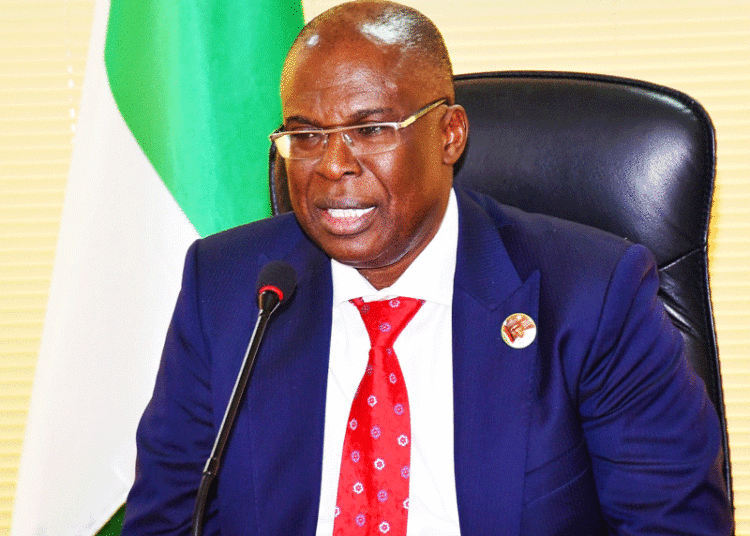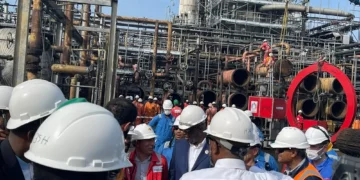The minister of state for petroleum resources, Timipre Sylva, has said that Nigeria and other energy-poor Africans countries require all energy sources to drive development in their countries.
Sylva, who made this comment during the three-day Nigeria-Africa Natural Resources and Energy Investment Summit that ended in Abuja on Friday, with the theme “Towards A Greener Economy”, stated that, for now, renewable sources alone cannot provide enough supply for the energy needs of developing countries.
According to him, oil and gas will continue to be needed, especially in energy-poor countries in sub-Saharan Africa, but that they must use good technology in prospecting for oil.
Sylva also revealed that even when it comes to green energy, Nigeria will not be left behind as advanced countries in Europe are already considering to classify gas as a green energy source, which Nigeria has rich deposits in.
Speaking in similar vein, the secretary general of African Petroleum Producers Organisation (APPO), Dr Omar Farouk Ibrahim, said that African countries should not be rushed into abandoning fossil fuels, which they have 30 percent of global deposit.
According to him, a forced energy transition for Africa would deepen the energy-poverty plaguing the continent, even as he pointed out that the West ignored research findings in the19th century which alerted to the threat of hydrocarbons to the environment and used them to develop their economies and technology, only to be pushing Africa to abandon that resource now that she needs it for development.
Ibrahim said the energy transition policies cannot be uniformly applied, saying doing so would be unfair and unjust.
On his part, the minister of power, Abubakar Aliyu, told African countries that they cannot depend largely on fossil fuels as they are not sustainable for long-term economic growth and development.
Speaking at the energy summit, the power minister advised African countries to develop renewable energy sources as the world is moving away from climate-unfriendly fossil fuels, which is evident in their recent investments in renewable energy sources.
Aliyu said: “Dependence on fossil fuels and hydrocarbons will soon be unsustainable as we match towards our Net Zero commitments and Nationally Determined Contributions (NDCs).
“For Nigeria, we have committed to Net Zero by the year 2060. In the light of the global challenge of rising temperature and our collective resolve to reduce it to below 1.5 Degrees centigrade, countries must explore ways to develop renewable energy. It is interesting to observe that most Africans do not have access to electricity.”
He, however, said Africa had enormous renewable energy potential which can contribute substantial power generation to support the continent’s economic growth.
The minister further highlighted some of the collaborations between the federal government and other African countries in the power sector.
He said, “For example, the West African Power Pool (WAPP) programme affords us the opportunity to work with other African countries to build a 330kV Double Circuit Line from Birnin- Kebbi all the way to Burkina Faso, passing through Niger, Togo/Benin.
“Also, we are building the AKK Gas Pipeline project passing through Ajaokuta, Kaduna and through North Africa to Europe.
“Furthermore, we have built another gas pipeline from Escravos to supply gas to Ghana with connection points at Benin Republic and Togo. To survive as a continent, we must collaborate.
“Countries like Nigeria have made commitments to achieve their Nationally Determined Contributions (NDCs) in line with the Paris Agreement on Climate Change and the COP26 Agreement in Glasgow.
“To achieve this, we have to scale up our solar, wind, hydropower and even the new hydrogen opportunities, including other new clean technologies.”
The three-day Nigeria-Africa Natural Resources and Energy Investment Summit, which was hosted by the Ministry of Mines and Steel Development, is projected to become a yearly affair,.
Permanent Secretary in the Ministry, Dr Oluwatoyin Akinlade, said the summit had opened a new outlook for energy sources’ development with a focus on the development of clean natural resources to meet the power needs of African economies.
He said, “Nigeria and indeed Africa needs to be up to speed in the drive for clean energy security, both in production and consumption.
“It has been stated that the conventional resources base is sufficient to meet the projected growth in demand with technology advances and breakthroughs being critical in supporting this process.
“On environmental concerns, we have listened to speakers stressing how environmental concerns will continue to have a huge bearing on energy resources’ future direction with pressure mounting in favour of adherence to cleaner resources. We need to develop and implement a robust response strategy in this direction.”





